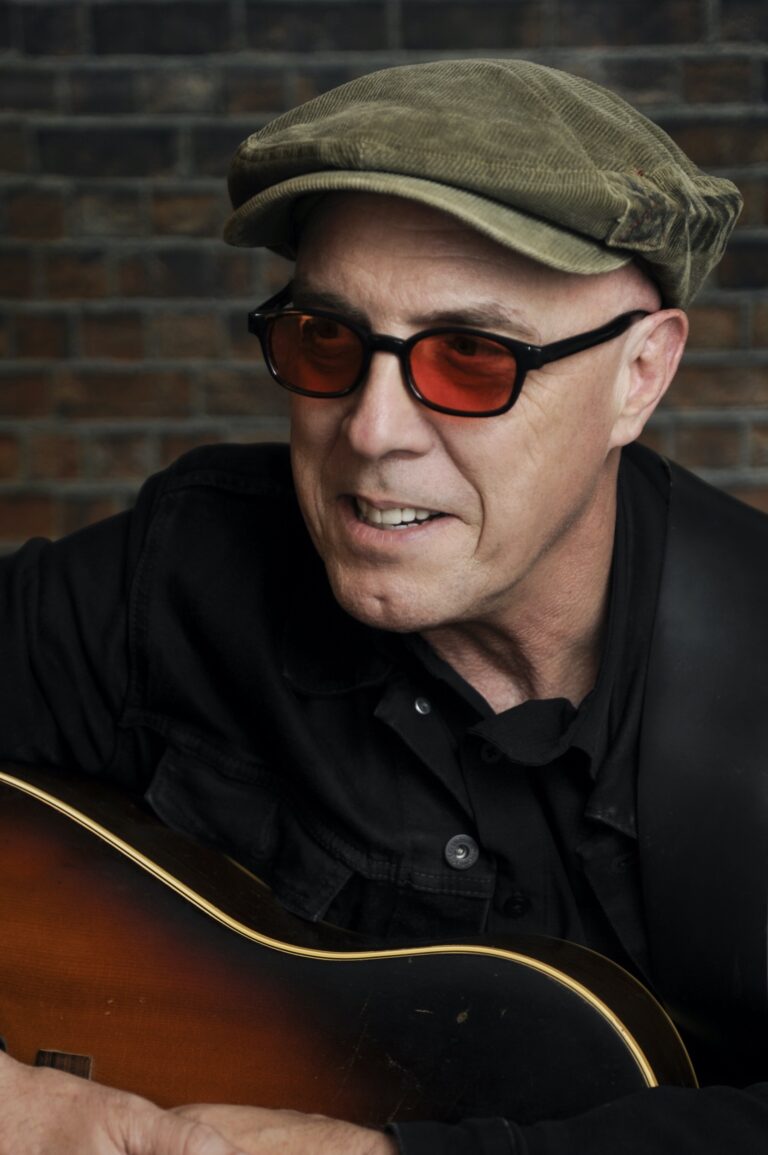Freedy Johnston is one of those rare singer-songwriters who counts critics among his biggest fans — and whose heroes consider him a peer. Not bad for a self-proclaimed “geek in glasses who never left his room.”
On September 9th, Forty Below Records will release Johnston’s 9th album, Back on the Road to You. It’s a record steeped in wit, humor, pathos, love, and friendship drenched with memorable, infectious melodies. Johnston recorded the album in Los Angeles with producer Eric Corne after setting up house in nearby Joshua Tree. The new surroundings have imbued the album’s mood and instrumentation with echoes of The Byrds, Jackson Browne, Joni Mitchell, and Neil Young. Joining Johnston in the studio were Aimee Mann, Susanna Hoffs of The Bangles, and long time collaborator, Susan Cowsill, along with an all-star roots music band, including Doug Pettibone (Lucinda Williams), Dusty Wakeman (Jim Lauderdale), Dave Raven (Shelby Lynn) and Sasha Smith (Priscilla Ahn).
In 1994 Rolling Stone named Johnston the ‘Songwriter of the Year’, describing him as “A master storyteller, (who) sketches out full-blown tragedies in a few taut poetic lines.” Adding, “He joins that elite cadre of songwriters—Bob Dylan, Neil Young, Elvis Costello—whose brilliant pop compositions turn magical with the addition of a defiantly idiosyncratic singing voice.”
Lead-off single “There Goes a Brooklyn Girl” is a case in point. Jangly hook-laden guitars tug at a heartbeat drum pattern, propelled by intermittent finger snaps. Along with Johnston’s uncanny lyrical charm and sweet sentimental harmonies, it evokes the image of “a never-ending love story. She’s the hip girl in the office who lives with her musician boyfriend out in Williamsburg. He tends bar until 4. It can’t last. But at least a song comes out of it,” Johnston quips.
Aimee Mann joins Johnston on the angelic “Darlin’,” a song about undying love and the ghosts of the night. Enhanced by Doug Pettibone’s lilting pedal steel guitar, it wouldn’t sound out of place in a Gram and Emmy-Lou set. Aimee stated, “I’ve always loved Freedy’s voice and songwriting. There’s something so matter-of-fact yet plaintive about his records, and that combination is incredibly compelling. I’m absolutely delighted he has a new record coming out and even more delighted to be singing on it.”
“Tryin’ To Move On” is a raucous road trip song about reinvention via misadventure. While “Madeline’s Eye” – a song only Johnston or maybe Harry Nilsson could have written – is a charming futuristic satire where the machines even take over our hearts. “At the altar, you’ll be asked, “have you read the manual thoroughly?” Johnston jokes.
Elsewhere the album veers from the Crazy Horse laced “Power of Love” (featuring Susan Cowsill) to the lush orchestration of “Somewhere Love” and “Trick of the Light,” further reinforcing the overarching themes of the album.
Freedy Johnston has taken an unpredictable path throughout his 30-year career. It’s a true underdog story. He has a wicked gift for turning a melodic phrase with equal parts’ heart on his sleeve’ troubadour and weaver of mysteries. The Kansas native released his first two records with the widely respected indie label Bar/None. Can You Fly made many ‘Best of the Year’ lists, including, The New York Times, Billboard, and Spin Magazine, to name a few. Robert Christgau for The Village Voice called it “a perfect album,” and Playboy declared it “the best album by a new male singer-songwriter in at least a decade.” Can You Fly was also cited in music critic Tom Moon’s book, 1,000 Recordings To Hear Before You Die.
All the critical acclaim helped Johnston land a four-album major-label deal with Elektra Records. Butch Vig was brought onboard to produce 1994’s This Perfect World. The album opened with the hit “Bad Reputation” and included other standouts such as the title track and “Evie’s Tears.” It garnered more critical acclaim for Johnston, who recorded three additional records for Elektra, 1997’s Never Home (produced by Danny Kortchmar), 1999’s Blue Days Black Nights (produced by T Bone Burnett), and 2001’s Right Between the Promises (produced by Cameron Greider).
Freedy has contributed music to films such as The Farrelly Brothers cult classic Kingpin as well as Things to do in Denver When You’re Dead, and Kicking and Screaming. A series of albums followed his Elektra output, 2006’s Live at McCabes Guitar Shop, as well as 2010’s Rain on the City. In 2015 the self-funded Neon Repairman was released to critical raves from Stereogum, Paste, The New York Times, and Magnet.
Back on the Road to You is a return to grace for this gifted songwriter. It embodies the sound of an American original, reminding us that he is still considered one of the best songwriters of his generation.

